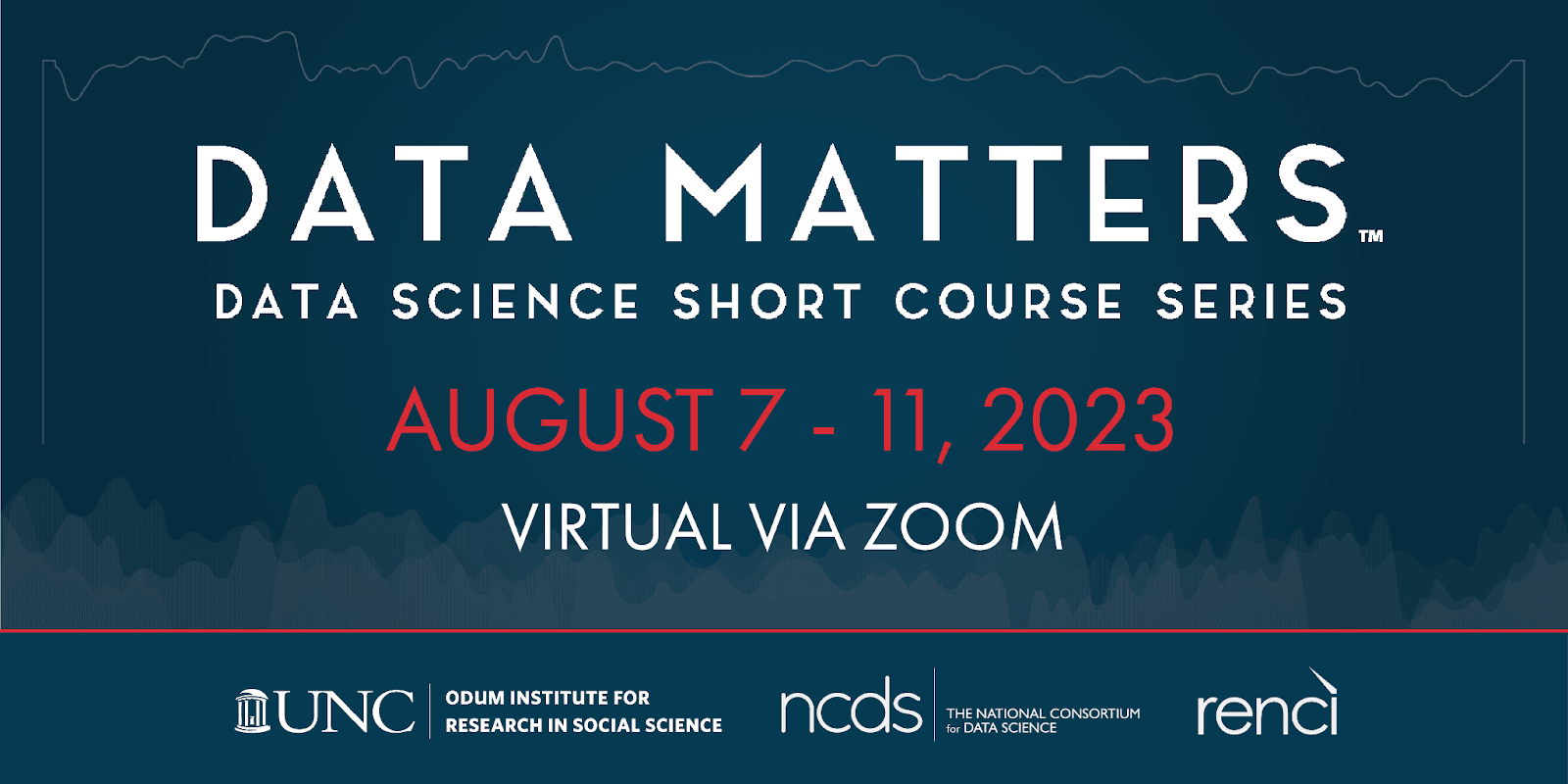news
Data Matters short-course series returns in August 2023
Annual short-course series aims to bridge the data literacy gap
Now in its tenth year, Data Matters, a week-long series of one and two-day courses aimed at students and professionals in business, research, and government, will take place August 7 – 11, 2023 virtually via Zoom. This short course series is sponsored by the Odum Institute for Research in Social Science at UNC-Chapel Hill, the National Consortium for Data Science, and RENCI.
In recent years, employers’ expectations for a data literate workforce have grown significantly. According to a 2022 Forrester Research Report, 70% of workers are expected to use data heavily in their jobs by 2025 – up from only 40% in 2018. Data Matters recognizes this rapidly changing data landscape and provides attendees the chance to learn from expert instructors about a wide range of topics in data science, analytics, visualization, and more.
“Upskilling is critical to maintaining a competitive workforce in today’s economy. With the rapid increase of data science tools being used in sectors such as business, research and government, it is essential that workers seek out educational opportunities that empower them to address new challenges in their field,” said Amanda Miller, associate director of the National Consortium for Data Science. “Our short-course series has fifteen courses that can be tailored to achieve individual data science goals, whether registrants are looking to refresh their knowledge or trying to learn something new in a welcoming, understanding environment.”
Data Matters instructors are experts in their fields from UNC-Chapel Hill, NC State University, Duke University, NC Central University, UT San Antonio, Oklahoma State, and more. This year’s topics include information visualization, deep learning, exploratory data analysis, statistical machine learning, artificial intelligence, and more, with classes such as:
-
Basic Statistics in R, Vanessa Miller. This course focuses on analyzing a dataset to answer a research question. Students will get hands-on practice with selecting the statistical procedure to answer a research question, performing the appropriate statistical test, and interpreting the output. May be of particular interest to those who are switching to R from another program such as SAS or Stata.
-
Advanced Visualization in R: R Shiny, Angela Zoss. This course will cover the basics of creating R-based web applications with Shiny, an R package that blends data science and statistical operations with interactive interface components. Participants will learn to connect interactive inputs with R operations, develop skills in web application design, and explore different options for hosting Shiny applications on the web. Basic familiarity with R is required.
-
Overview of AI and Deep Learning, Siobhan Day Grady. Many key advances in AI are due to the advances in machine learning, especially deep learning. Natural language processing, computer vision, speech translation, biomedical imaging, and robotics are some areas benefiting from deep learning methods. We will look at the history of neural networks, how advances in data collection and computing caused the revival in neural networks, the different types of deep learning networks and their applications, and tools and software available to design and deploy deep networks.
-
Geospatial Analytics, Laura Tateosian. This course will focus on how to explore, analyze, and visualize geospatial data. Using Python and ArcGIS Pro, students will inspect and manipulate geospatial data, use powerful GIS tools to analyze spatial relationships, link tabular data with spatial data, and map data. In these activities, participants will use Python and the arcpy library to invoke key GIS tools for spatial analysis and mapping.
Data Matters offers reduced pricing for faculty, students, and staff from academic institutions and for professionals with nonprofit organizations. Head to the Data Matters website to register and to see detailed course descriptions, course schedules, instructor bios, and logistical information.
Registration is now open at datamatters.org. The deadline for registration is August 3 for Monday/Tuesday courses, August 5 for Wednesday courses, and August 6 for Thursday/Friday courses.
About the National Consortium for Data Science (NCDS)
The National Consortium for Data Science (NCDS) is a collaboration of leaders in academia, industry, and government formed to address the data challenges and opportunities of the 21st century. The NCDS helps members take advantage of data in ways that result in new jobs and transformative discoveries. The organization connects diverse communities of data science experts to support a 21st century data-driven economy by building data science career pathways and creating a data-literate workforce, bridging the gap between data scientists in the public and private sectors, and supporting open and democratized data. Learn more at datascienceconsortium.org/.
The NCDS is administered by founding member RENCI, a research institute for data science and applications of cyberinfrastructure at the University of North Carolina at Chapel Hill. For more information about RENCI, visit renci.org.
